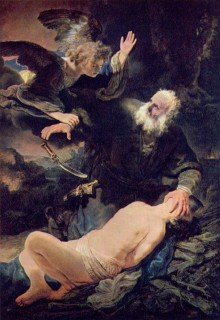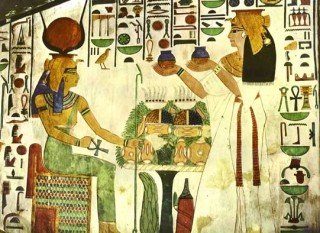
The point that the God of the Bible was trying to make of the story of the Binding of Isaac, was totally outdated and irrelevant.
Imagine that you are in your old age, and you only have one son whom you love and adore so dearly. But lately you’ve been having this recurring dream in which you grab a knife and hide it in your briefcase, and then you discreetly take your son to a deserted place, and try to talk him into yielding to your desire to kill him by cutting his throat, because in doing so, you would be obeying God’s orders.
I think that on waking up in the next morning from that scary dream you would consider two options;
1. That the recurring dream is nothing but a dreadful nightmare and you should dismiss it as such.
2. Seeing a psychiatrist, because you will need professional help to get to the bottom of this.
But Abraham- a character failed to be historically validated – didn’t think so and neither did we, his nightmare became ours, somehow we bought into this depraved story of the Binding of Isaac, and held it close to our hearts as sacred and true story.
Judaism, Christianity, and Islam are sometimes referred to as the “Abrahamic religions” because of the progenitor role that Abraham plays in their holy books. In both the Jewish tradition and the Quran, he is referred to as “our Father”.
Jews, Christians, and Muslims consider him father of the people of Israel. For Jews and Christians this is through his son Isaac, by his wife Sarah; for Muslims, he is a prophet of Islam and the ancestor of Muhammad through his other son Ishmael, born to him by Sarah’s handmaiden, Hagar.
In reviewing the Binding of Isaac – in the Judeo-Christian story- or the Binding of Ishmael – in the Islamic story- one gets to clearly discover that the three religions stemmed out of the same narratives and ancestral characters but with some suitable variations.
Some biblical scholars, Jews included, have read the story as a protest against human sacrifice, the significant point being that the angel intervenes to prevent the murder as an obscene act that God, unlike the pagan deities, hates and could never really have intended.
But it is worth mentioning from a historical point of view that all the cultures of the Levant and ancient near east did not know of human sacrifice, the civilization of ancient Near East Empires Around 1350 B.C, Egypt, Babylon, Mitanni, Hittite and Assyria only allowed offerings of food and animals but never humans.
In other words they enjoyed a more elevated and more ethical religions than the Jewish doctrine as far as the offering rituals are concerned. So the point that the God of the Bible was trying to make of the story of the Binding of Isaac, was totally outdated and irrelevant.

By the Iron Age, with the associated developments in religion, human sacrifice was becoming less common throughout the Old World, and came to be widely looked down upon as barbaric already in pre-modern times.
“The unexamined life is not worth living” – Socrates
But this barbaric act of sacrificing Isaac/ishmael was considered one of the most revered stories in the three religions, throughout the years no one bothered to question its rationality or doubt its absurdity. Unlike In the Platonic dialogue when Euthyphro is on his way to the court of Athens to attempt to have his father prosecuted and executed. When Socrates hears about this he intercepts him and asks him if that is a pious thing to do? Is it morally correct to try to have your father found guilty and executed? He questions Euthyphro about what being pious is. Euthyphro first tries to say that to be pious/morally correct is what the gods think is good. Socrates asks if something is good because the gods say it is and that makes it good. Or is something good and therefore the gods are pleased with it?
If we are not allowed to examine the rationale behind a lot of the old Bible stories and myths as in the case of Binding Isaac, which clearly points out the fact that humans are at the mercy of an omnipotent God. then we will automatically turn the once true believers of the Bible into mere followers to an authoritarian dogma.
The Bible is full of refuted historical events, a lot of unfulfilled prophecies and innumerable hard to believe-stories, the Binding of Isaac is one of the weirdest and most depraved biblical stories.
Significantly, many people want to argue about whether God exists but almost no one discusses what exactly this God IS. If you believe in the God of the Abrahamic religions then you must believe in a god that runs around getting angry and making bets with devils (Book of Job) and covenants with Jews.
The Abrahamic God- most unlikely of a divinity – acquired human traits, characteristics and imperfections. So instead of becoming the loving God of all creatures and humans, he decided and unjustifiably to be the loving God of the Jews only.
And even more he began to pull some strings and play some politics to safeguard the earthly acquisitions of his people, and he even guaranteed – and that where the bible scribes went too far – that the world would come to a horrible end- End Times – if his chosen people faced the final and ultimate danger of destruction. And that what led some fundamentalist Christians and Zionist Christians to form pro-Israeli organizations like “Christians United for Israel”, incorporated in 2006, with Israel Propagandist John Hagee as chairman.
In this way, the Jews-serving bias of the Bible transformed it into an authoritarian dogma, a scripture that delegitimatizes reason as a valid means of dealing with the world. It imposes irrational and biased views and at the same time expects nothing less than the unconditional reverence and obedience on the followers’ behalf.
According to The American scholar Erich Fromm (1900–1980), in his book Psychoanalysis and Religion, he defined authoritarian and humanistic religion as a way to understand the tension between ritual perfection and human capabilities.
Humanistic religion, he writes, is centered around man and his strength…Man’s aim in humanistic religion is to achieve the greatest strength, not the greatest powerlessness; virtue is self-realization, not obedience. The prevailing mood is that of joy, while the prevailing mood in authoritarian religion is that of sorrow and guilt. Thus, it is not surprising that the whole of Abrahamic doctrine is based upon this notion of “Guilt”, and particularly due to a sin allegedly committed by someone who seemingly never existed outside the boundaries of the Bible.

Ashraf Ezzat is an Egyptian born in Cairo and based in Alexandria. He graduated from the faculty of Medicine at Alexandria University.
Keen not to be entirely consumed by the medical profession, Dr. Ezzat invests a lot of his time in research and writing. History of the ancient Near East and of Ancient Egypt has long been an area of special interest to him.
In his writings, he approaches ancient history not as some tales from the remote times but as a causative factor in our existing life; and to him, it’s as relevant and vibrant as the current moment.
In his research and writings, Dr. Ezzat is always on a quest trying to find out why the ancient wisdom had been obstructed and ancient spirituality diminished whereas the Judeo-Christian teachings and faith took hold and prospered.
Dr. Ezzat has written extensively in Arabic tackling many issues and topics in the field of Egyptology and comparative religion. He is the author of Egypt knew no Pharaohs nor Israelites.
He writes regularly at many well-known online websites such as Dissident Voice and What Really Happened.
Dr. Ezzat is also an independent filmmaker. His debut film was back in 2011 The Annals of Egypt Revolution and in 2012 he made Tale of Osiris a short animation for children.
In 2013 his short The Pyramids: story of creation was screened at many international film festivals in Europe. And he is working now on his first documentary “Egypt knew no Pharaohs nor Israelites”.
ATTENTION READERS
We See The World From All Sides and Want YOU To Be Fully InformedIn fact, intentional disinformation is a disgraceful scourge in media today. So to assuage any possible errant incorrect information posted herein, we strongly encourage you to seek corroboration from other non-VT sources before forming an educated opinion.
About VT - Policies & Disclosures - Comment Policy



